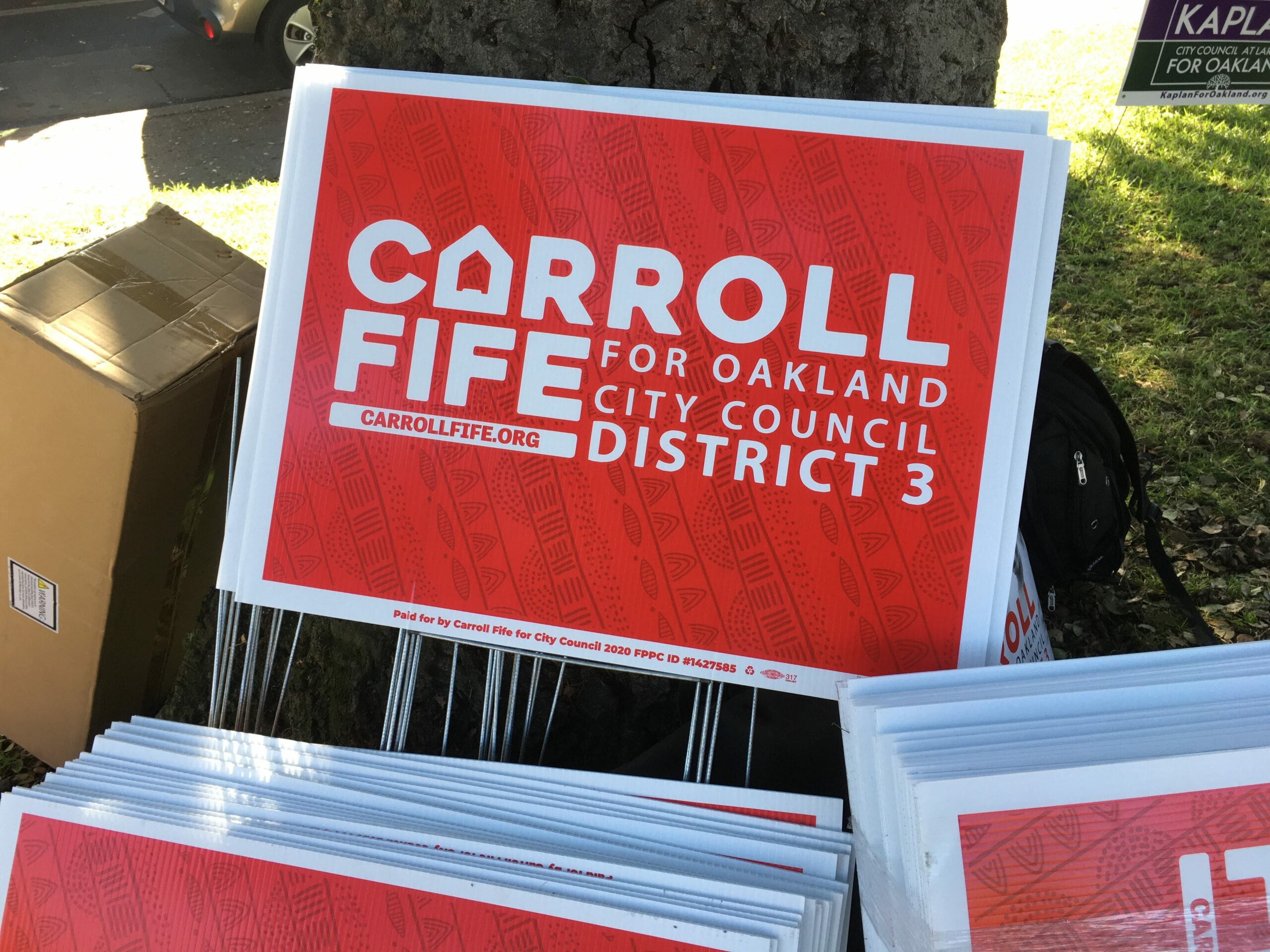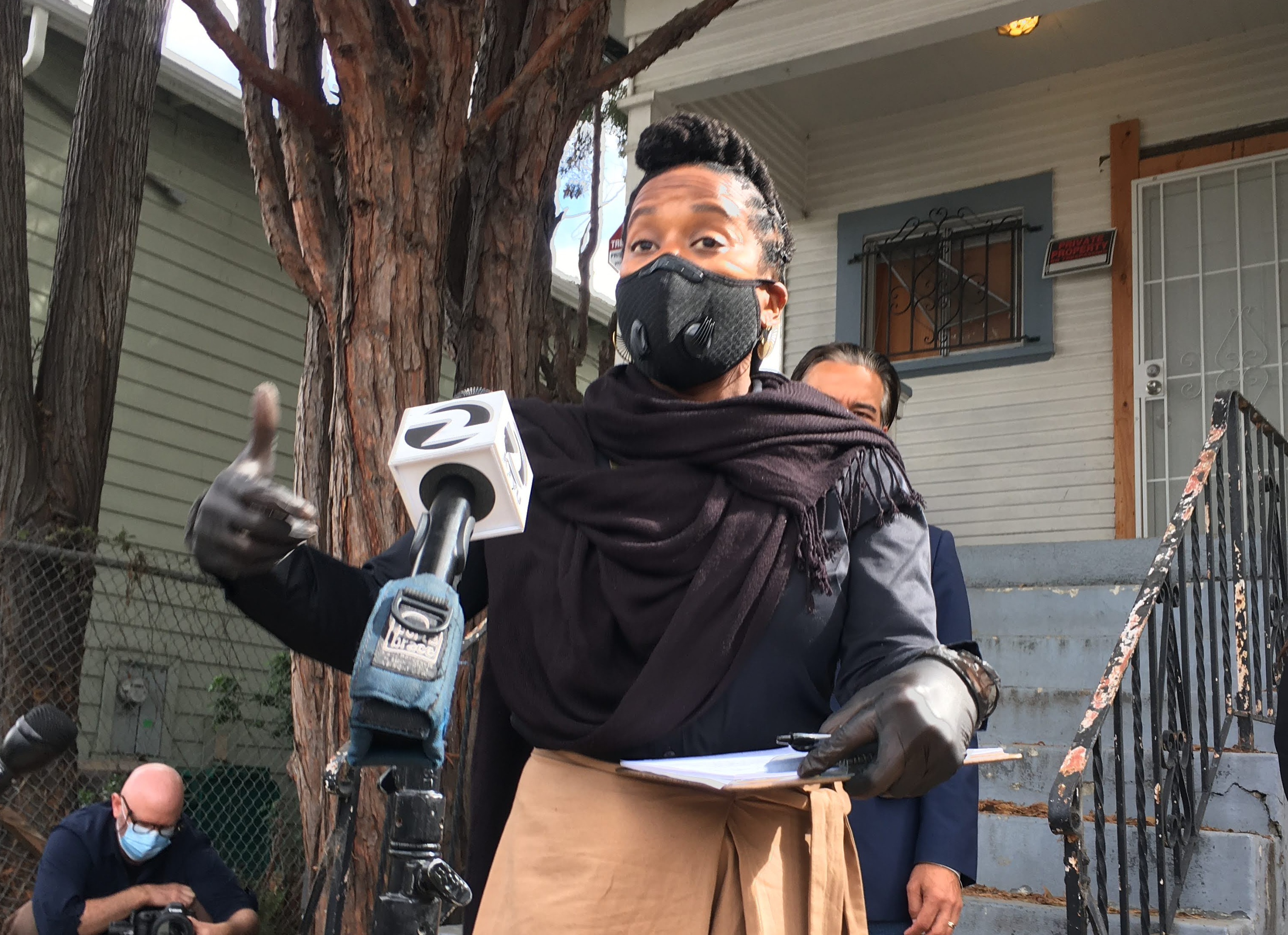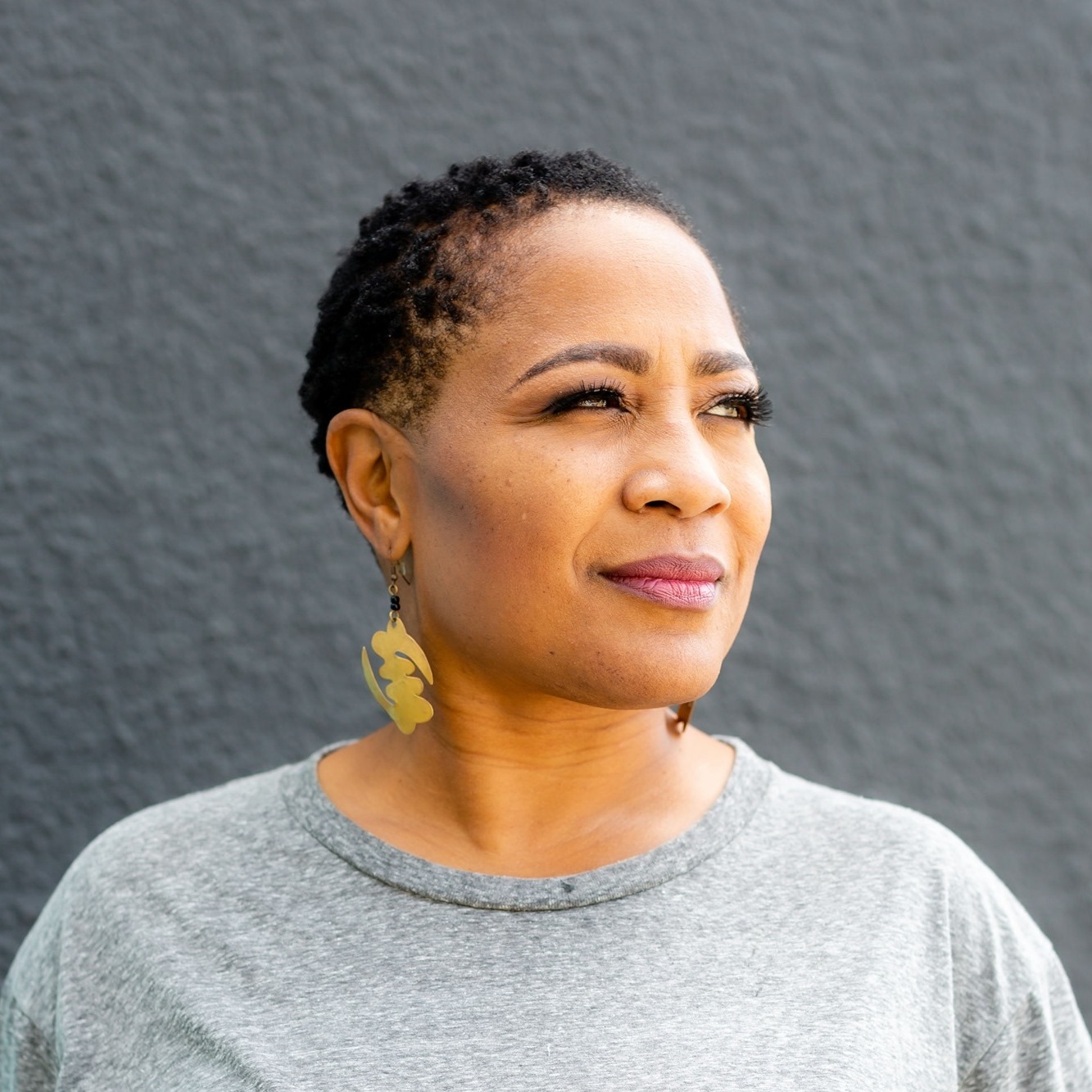By KPFA election reporter Ariel Boone (@arielboone)
OAKLAND, CA – On a sunny Saturday morning in DeFremery Park in West Oakland, 50 people have come to knock on doors. There are ironworkers, students, democratic socialists, even Sunrise Movement climate activists — all here to support Carroll Fife, a candidate for Oakland city council in District 3.

“Who’s door knocking for the first time ever?” precinct captain Mary Schindler asks the crowd. Several hands go up. Everyone cheers. “Yes! You guys, that’s awesome!”
West Oakland is a historically Black neighborhood, rapidly gentrifying, and one of the epicenters of the 2008 foreclosure crisis. Last year, it was also the site of an action that drew national attention: A group of unhoused Black moms, calling themselves “Moms 4 Housing,” took over an empty investor-owned home, occupied it for over two months, and eventually — after heavily-armed sheriffs evicted them — forced the owner to sell the property to a land trust for conversion to permanently affordable housing. Carroll Fife, the Oakland director of Alliance of Californians for Community Empowerment, or ACCE, was a key organizer behind the moms’ action. Now she is trying to unseat the councilmember who represents the neighborhood, aiming heavy fire at the incumbent’s votes on policing and tenants’ rights.
Today, Fife says she has a network of over 600 volunteers phone-banking, text-banking, and canvassing. “We’ve knocked on about 12,000 doors,” says Fife’s volunteer coordinator, Katie Tertocha. This is all in one council district of about 57,000 people, and all to unseat one incumbent.
Who’s represented in the fight for housing rights?
In 2016, Lynette McElhaney won a second term in the district with 13,000 votes.
“I am a very proud Oaklander, wife and mom and grandmother, and a person has been deeply involved in community level work,” Lynette McElhaney tells me.
McElhaney has been in office eight years. She’s seeking a third term. She says she wants to address the housing and homelessness crisis by building housing for all income levels. She emphasizes the importance of private homeownership, using the example of the house her parents bought with GI Bill benefits.
“My family was more stable than that of my neighbors,” McElhaney says. “I believe in property ownership, I believe in securing families, neighborhoods through ownership, I believe in the generational transfer of wealth. And I know that that helped define a middle class.”
McElhaney is the only property owner in this race. And her focus on property owners — including landlords — has put her at odds with groups working for tenants’ rights. In 2018 she tried to take away eviction protections from renters in owner-occupied fourplexes.
“I literally got surrounded by a group of elderly black women at a funeral,” McElhaney explains. “We couldn’t even grieve, because they were afraid of what they called the ‘liberal majority’ of the council was doing to them as Black women, as Black elderly women who had worked hard, their entire lives. And they felt that this was a push to erase them. And I had an obligation to hear from them and to try to raise their voice on council.”

Fife says McElhaney has been reticent to help tenants facing displacement from the district during her tenure, including members of ACCE. “If you ask any housing organization in the city of Oakland, they will tell you how oppositional that the councilmember has been to renters and anything that would protect renters.”
“I had a family that lived in a [threeplex] for three generations, and they were calling the councilmember repeatedly saying that they were going to be evicted illegally. And she would not return their calls. And ultimately said the landlord was well within his power to evict them because he wanted to move in. And they said, ‘He’s not moving in. He’s going to sell the property.’ And she would not help. They were evicted. Four generations, 50 years, in one home. And as soon as he got everybody out, he sold the house for $1.5 million.”
Fife has confronted McElhaney for her votes on council in the past. In 2019, she rebuked McElhaney in public comment during a council meeting for “repeatedly interrupting” community members who came to testify against proposed changes that would have lengthened the time required to submit ballot measures.
Fife says her own family was also displaced from West Oakland years ago, by an owner move-in eviction. She says it was illegal — the owner never moved in. She wants to decommodify housing, move it out of the private market, and treat it as a human right.
“I believe that the whole idea of housing being built and construction constructed to address the housing crisis. Is a little fallacious. We see housing being built all over the place, it’s just not affordable,” Fife says.
“There are several of these luxury units that are vacant right now. You’ll have 50% vacancies in a lot of these different buildings. So let’s get people in there, and let’s build in the places that have been segregated for decades, like Rockridge.”
It is a very serious campaign. Fife’s years of organizing work helped her pick up high-profile endorsements, including from Bernie Sanders, the Alameda Labor Council, and tenants’ rights groups. She’d raised $176,000 from individual donations as of October 16. That’s slightly more than the incumbent. Labor unions have also dropped nearly $400,000 into an independent expenditure committee supporting Fife and at-large council candidate Rebecca Kaplan.
McElhaney’s high-profile endorsements include state senator Nancy Skinner, Oakland Mayor Libby Schaaf and San Francisco Mayor London Breed.
McElhaney faces questions over ethics, policing votes
There are other candidates in the race — Oakland uses “instant runoff” or ranked-choice voting, so there was no primary. They all have much less funding and organization. But each candidate I spoke with aimed more fire at McElhaney than Fife.

Candidate Seneca Scott says his top issues are homelessness, blight and illegal dumping. He moved to Oakland 8 years ago to work for SEIU Local 1021–one of the unions now backing Fife. Scott founded a community garden and kitchen, where he runs his campaign. He says he has about a dozen volunteers.
“I think Lynette just doesn’t have the bandwidth or the energy anymore,” Scott says. “If you’re undergoing ethics investigations, and new ethics investigations about using the money from the old ethics investigation, to pay her lawyer — I mean, it was just kind of a lot.”
Scott is referring to ethics violations that have plagued McElhaney’s campaign.
A grand jury in 2016 said McElhaney inappropriately used her council office and resources to stop multi-unit housing from being built next to her home. She was ordered to pay a fine — so she created a legal defense fund — and then took an illegal contribution from a developer who had business before the city, which she voted for. That developer, Lane Partners, was fined $5,000 for the contribution. The company’s lawyer is still listed as McElhaney’s legal fund principal officer.
I asked McElhaney if she had any regrets for taking money from Lane Partners. She said, “I have literally no idea what you’re talking about.”
Another candidate in the District 3 race, Meron Semedar, questions the logic of building market rate housing in the district. Semedar is an Eritrean refugee who has lived in Oakland for eight years, and works with African students at UC Berkeley.
“If we look at Lynette, she’s been in office for the last two terms eight years. And while she was in office, housing has become a huge problem in Oakland. We see there’s a lot of housing being built, but it’s not really addressing our housing crisis.”
McElhaney also faces fierce criticism for a vote on police funding this summer. After the police killings of George Floyd and Breonna Taylor, hundreds called into Oakland council meetings demanding the defunding of police. On June 23, 2020, McElhaney joined a group of councilmembers that derailed a proposal to cut the police budget by $25 million, by pushing a surprise vote on a budget that the public had not seen, which included smaller cuts and a “task force” to consider future cuts.
The public comment at that meeting sounded like this:
“We need to defund the Oakland Police Department. It is honestly shameful that you have done this.”
“I’m just so sad. And it just really strengthens my commitment to making sure you’re unseated.”
“Shame on all of you. I am so disappointed, and you have let me, as a Black woman, down.”
“Voting on the budget this evening was absolutely absurd. You clearly aren’t listening to us. So, Councilmember McElhaney, my councilmember, is up for re-election this year. And with our work, she’ll be unseated. Bye, McElhaney. You won’t be missed.”
McElhaney insists she is listening to her constituents — but to the ones who didn’t call into the Zoom meeting. “This blaming and blocking business is, first of all, irresponsible to talk about what actually happened,” she says.
She maintains that cutting $25 million from police, a proposal by District 2 councilmember Nikki Fortunato Bas, would have done a disservice to crime victims. McElhaney lost her son and grandson to gun violence.
“We said, show us how this will not hurt victims families. I spent four years sitting in the living rooms of people who have suffered loss in this community, people who don’t come with anger and righteous indignation on a Zoom or into city hall, whose pain and hurt have been ignored in this community for nearly 30 years, and the residents in District 3 that have been demanding increased police presence were not asking me to be reckless,” McElhaney says.
“It just really strengthens my commitment to making sure you’re unseated.” – Caller in public comment at the Oakland City Council meeting on June 23, 2020
In contrast, Carroll Fife says disinvesting from police and reinvesting in public services is central to her platform. She says police should be reassigned from conducting traffic stops, going to encampment evictions, staffing special events, and towing cars.
“I would love to see that the police budget goes down to nothing,” she says. “I think it’s going to take a minute for our society to actually invest and see a return on actually making sure that people are getting the services that they need. Because this whole system is based on the market, there are going to be forces that try to intervene, and probably you’ll see a spike in crime, because police are involved in manufacturing crime.”
If Oakland does have policing, Fife adds, “I would love to see it focused on the top on white collar criminals that are actually stealing entire neighborhoods, immunities and disinvesting and shifts in wealth from working class people the wealthy elites. That’s the real crime.”
A chance to build power for West Oakland
Oakland’s wealthier council districts have traditionally wielded more money to influence city races. But whoever occupies the District 3 seat next has an enormous amount of work ahead of them, from weighing the impact of any proposed development at Howard Terminal, to environmental cleanup, and meeting the needs of the city’s unhoused residents, many of whom live in West Oakland. Accomplishing change will require building power for the district.
“Jerry Brown said he would break, his goal was to dismantle, the Black political establishment in the city of Oakland. That was his role and his goal as mayor. And he’s effectively done that. And his chief of staff through Libby Schaaf as mayor has extended that,” Fife says.
“Schaaf has to have a group that’s on the city council that’s beholden to her ideas to continue the displacement of Black bodies from the city, as well as enact policies that allow developers and corporations to have free reign.”
Fife promises to keep her campaign organizing structure intact after the election whether she wins or loses, with neighborhood leaders in place to continue to push legislation in the city.
The District 3 election is about more than just whether an economic and housing justice activist makes it to public office. It’s also about building power for residents of West Oakland, long an environmental dumping ground. And it could determine whether Oakland Mayor Libby Schaaf has a supportive majority on the council — which would impact everything from how the city bargains with unions, to what it does about its police department, and how this booming town with a long and radical Black history responds to rapid gentrification.
Update Oct. 22 – This story has been corrected to indicate the District 3 family was evicted from a threeplex, and to remove a mention of any endorsement by Kamala Harris in the race.

